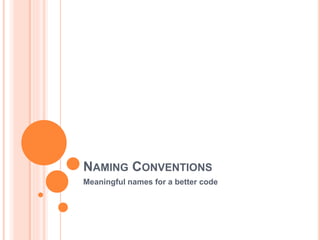
Naming Conventions
- 1. NAMING CONVENTIONS Meaningful names for a better code
- 2. INTENTION REVEALING NAMES The name of a variable, function, or class, should answer all the big questions. It should tell you why it exists what it does how it is used. If a name requires a comment, then the name does not reveal its intent. int d; // elapsed time in days Replacing with this int elapsedTimeInDays;
- 3. AVOID DISINFORMATION Programmers must avoid leaving false clues that change the meaning of code. We should avoid words vary from our intended meaning. Do not refer to a grouping of accounts as an accountList unless it’s actually a List. The word list means something specific to programmers
- 4. DIFFERENT NAMES Beware of using names which vary in small ways First Names should be different to spot the difference How long does it take to spot the difference in XYZControllerForEfficientHandlingOfStrings And XYZControllerForEfficientStorageOfStrings Can you say the difference in these getActiveAccount(); getActiveAccounts(); getActiveAccountInfo();
- 5. USE PRONOUNCEABLE NAMES Humans are good at words.And words are, by definition, pronounceable class DtaRcrd102 { private Date genymdhms; private Date modymdhms; private final String pszqint = "102"; /* ... */ }; What about this class Customer { private Date generationTimestamp; private Date modificationTimestamp;; private final String recordId = "102"; /* ... */ };
- 6. USE SEARCHABLE NAMES Single-letter names and numeric constants have a problem in that they are not easy to locate across a body of text. One might easily search MAX_CLASSES_PER_STUDENT, but the number 7 could be more troublesome. Single-letter names can ONLY be used as local variables inside short methods. The length of a name should correspond to the size of its scope
- 7. AVOID ENCODINGS We have enough encodings to deal with without adding more to our burden. Encoding type or scope information into names simply adds an extra burden of deciphering Avoid Hungarian Notation Avoid Member Prefix m_ will no longer needed
- 8. CLASS NAMES Classes and objects should have noun or noun phrase names like Customer, WikiPage, Account, and AddressParser. Avoid words like Manager, Processor, Data, or Info in the name of a class. A class name should not be a verb
- 9. METHOD NAMES Methods should have verb or verb phrase names like postPayment, deletePage, or save. Accessors, mutators, and predicates should be named for their value and prefixed with get, set, and is accordingly string name = employee.getName(); customer.setName("mike"); if (paycheck.isPosted())... When constructors are overloaded, use static factory methods with names that describe the arguments.
- 10. PICK ONE WORD PER CONCEPT Pick one word for one abstract concept and stick with it. It’s confusing to have fetch, retrieve, and get as equivalent methods of different classes
- 11. ADD MEANINGFUL CONTEXT There are a few names which are meaningful in and of themselves—most are not. Instead, you need to place names in context for your reader by enclosing them in well-named classes, functions, or namespaces. When all else fails, then prefixing the name may be necessary as a last resort.
- 12. ADD MEANINGFUL CONTEXT-2 private void printGuessStatistics(char candidate, int count) { String number; String verb; String pluralModifier; If (count == 0) { number = "no"; verb = "are"; pluralModifier = "s"; } else if (count == 1) { number = "1"; verb = "is"; pluralModifier = ""; } else { number = Integer. toString(count); verb = "are"; pluralModifier = "s"; } String guessMessage = String.format( "There %s %s %s%s", verb, number, candidate, pluralModifier ); print(guessMessage); }
- 13. ADD MEANINGFUL CONTEXT-3 public class GuessStatisticsMessage { private String number; private String verb; private String pluralModifier; public String make(char candidate, int count) { createPluralDependentMessage Parts(count); return String.format("There %s %s %s%s", verb, number, candidate, pluralModifier ); } private void createPluralDependentMessageParts(int count) { if (count == 0) { thereAreNoLetters(); } else if (count == 1) { thereIsOneLetter(); } else { thereAreManyLetters(count); } } private void thereAreManyLetters(int count) { number = Integer.toString(count); verb = “are"; pluralModifier = "s"; } private void thereIsOneLetter() { number = "1"; verb = "is"; pluralModifier = ""; } private void thereAreNoLetters() { number = "no"; verb = "are"; pluralModifier = "s"; } }
- 14. DON’T ADD GRATUITOUS CONTEXT In an imaginary application called “Gas Station Deluxe,” it is a bad idea to prefix every class with GSD. The names accountAddress and customerAddress are fine names for instances of the class Address but could be poor names for classes. Address is a fine name for a class.
- 15. FINAL WORDS People are also afraid of renaming things for fear that some other developers will object. Developers do not share that fear and find that we are actually grateful when names change (for the better). Follow some of these rules and see whether you don’t improve the readability of your code. If you are maintaining someone else’s code, use refactoring tools to help resolve these problems. It will pay off in the short term and continue to pay in the long run.
- 16. THANK YOU
Editor's Notes
- Complex fulcrumPoint = Complex.FromRealNumber(23.0); is generally better than Complex fulcrumPoint = new Complex(23.0); Consider enforcing their use by making the corresponding constructors private
- You type G and press the completion key and are rewarded with a mile-long list of every class in the system. Is that wise? Why make it hard for the IDE to help you?